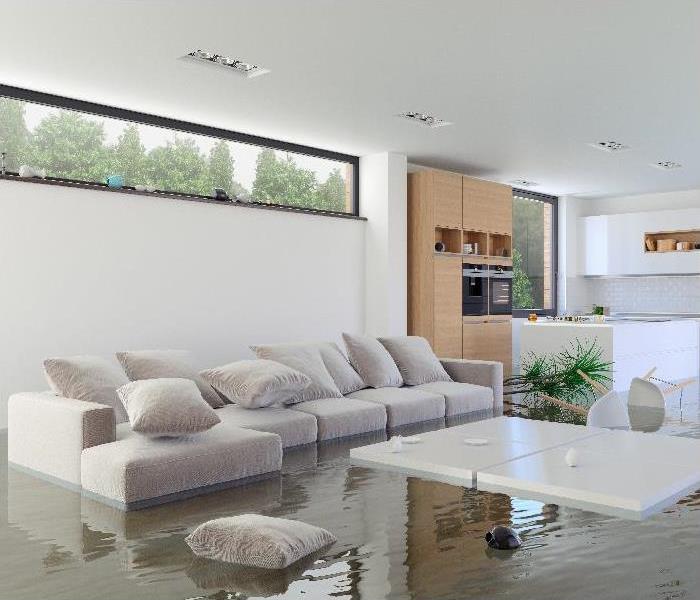How Can I Protect My Family from Dangerous Contaminants Due to Flood Damage in North Kingston?
7/28/2020 (Permalink)
SERVPRO Is Vigilant When Managing Category 3 Water, Using Research-Based Best Practices to Keep You and Your Family Safe from Flood Damage in North Kingstown
The hurricane season features storm activity that batters the entire Eastern Seaboard, including our North Kingston community. High winds, torrential rains, and storm surge all contribute to the chaos and damage flooding inflicts on houses in the area. The chance of exposure to dangerous contaminants carried in by the floodwaters is understandably worrisome to residents. Whatever company you hire to remove the flooding must have a robust and proven response to the cleaning and disinfecting required after it contains and lawfully disposes of the fluids.
What Kind of Contamination Might Be in the Mix of Flooding Fluids in My Home?
When flood damage occurs in North Kingston, a broad range of potentially hazardous substances can mix into the watery mess filling the spaces in your home. Rainwater is by far the most common component which might seem “clean,” but as it falls, it picks up airborne pollutants. On the earth’s surface it continues to gather contaminants as it heads into your home:
• Dirt, sand, oils, grease, and paving materials picked up as the rainwater flows over roads, parking lots, and sidewalks
• Industrial waste as the flooding rolls over business sites
• Landscaping chemicals from your own and neighboring lawns
• Overflow from sanitary sewers
• Dead animals, insects, and garbage
• Storm surge
Do I Need to Worry About My Home’s Waste Backing Up During Flooding?
If the municipal rainwater drainage system is overwhelmed by torrents of precipitation, it stands to reason that the waste draining through your sewer line risks pressure-based backup in the absence of a backflow valve. When the SERVPRO crew arrives, we evaluate all safety considerations, never ignoring the perils posed by the Category 3 water collecting in the lower levels of your home. We immediately check for sewer line contamination. The blood and fecal-borne organisms suspended in the water can cause severe illness and even death if not managed promptly and according to lawful best practices.
Does a Local Company Have the Capacity to Handle Highly-Contaminated Water and the Knowledge to Discharge It Lawfully?
Our technicians and managers are trained and well-prepared through coursework from the Institute of Inspection Cleaning and Restoration Certification (IICRC) to contain and dispose of tainted flood waters appropriately. Do not fear if others in your neighborhood face the same type of crisis as our resources are vast and scalable. Our ties to the community are intrinsic as we live and choose our base of operations here. Still, we also have access to a nationwide network of IICRC-trained and commercial-grade-equipped flood disaster professionals if required.
What Are the Phases of Flood Damage Mitigation and Remediation?
Assessment
An inspection of the extent of the damage and the nature of the contaminants and other hazards.
Planning
Using IICRC training and our managers’ considerable on-the-job experience, we plan out the interventions needed to bring your home back to “Like it never even happened.”
Implementation
Debris Removal
Using shovels and rakes, workers remove the solids swept into your home. This decreases the chance of clogging our equipment.
Hidden Water and Moisture Detection and Measurement
By employing devices that sense and meter moisture amounts, we locate flood water in building cavities. If needed, we take steps to use limited demolition techniques to release the water -- drilled or sawn holes or flood cuts in walls parallel to the floor and several inches above the flood line.
Water Removal
Submersible pumps positioned in the deepest places of the flooded area evacuate the bulk of the water. Truck-mounted extractors take out the residual standing water, capable of pulling off 36,000 gallons a day per machine. Pumps and truck-mounts operate on gas or generators, capable of extraction even if your electricity is temporarily disconnected. Portable backpack extractors can reach confined areas.
Water Containment and Disposal
Pumps drain into treated sewer lines, and our truck-mounted tanks can hold more than 100 gallons. Management keeps current with local regulations and arranges for the necessary paperwork and lawful disposal.
Cleaning and Disinfection
Our crews clean all affected surfaces with EPA-registered products and apply EPA-registered antimicrobials to inhibit the chance of pathogen regrowth.
Structural Drying
Data from the moisture testing plus measurements in unaffected areas in your home help us create drying goals. We then use air movers, heaters, and dehumidifiers to evaporate, capture, and contain for disposal the trapped moisture.
Hire the experts at SERVPRO of Newport & Bristol Counties with confidence when flood damage creates messy and potentially hazardous conditions in your North Kingstown home. We answer inquiries at (401) 847-8145 day and night, 365 days of the year.





 24/7 Emergency Service
24/7 Emergency Service
